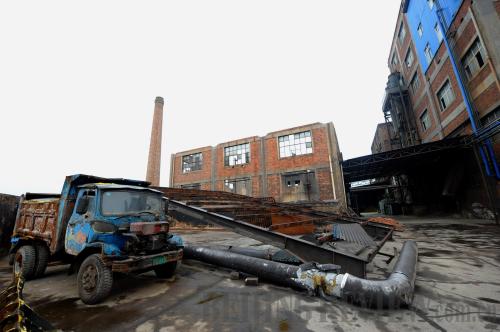|
 |
|
A LEFTOVER EVIL: A closed chemical plant in Qujing City, southwest China's Yunnan Province, on August 14, 2011 (CHEN HAINING) |
Such sites are often heavily contaminated because pollutants leaked into the soil during previous production processes. In some cases, the concentration of pollutants in the soil can be hundreds of times higher than regulations permit and the pollution has been documented to have penetrated as much as 10 meters into the soil in some places, according to a recent World Bank report.
"Many brownfield sites, if not managed well, will pose an environmental and health hazard in China's most densely populated areas, as well as an obstacle to urban and economic development," said Jian Xie, a senior environmental specialist with the World Bank.
Soil pollution usually involves toxic heavy metals from steel, iron and smelting plants, persistent organic pollutants (POPs) from pesticide residues, organic chemical compounds from petrochemical industries, and electronic waste.
Heavy metals and POPs seldom break down over time and can accumulate in the environment. They can be absorbed into the body through drinking water and the food chain, causing harm to organs or even cancer.
Luo Yongming, a researcher with the Institute of Soil Science affiliated with the Chinese Academy of Sciences (CAS), said that soil pollution is usually more difficult to identify than pollution in water and the air. However, once the soil is contaminated, it can release toxic substances for decades.
"Redevelopment without proper remediation can be a hidden danger for people working or living on the polluted site," Luo said. For instance, volatile substances such as benzene and formaldehyde can enter human body through breathing. And sometimes, children accidentally ingest dirt when they play on the ground.
However, the soil pollution issue did not attract public attention until 2004, when three construction workers were poisoned by toxic gas released from an old pesticide plant site as they drilled for the Songjiazhuang Subway Station in Beijing.
"There was no concept of soil remediation then," Gao said. "The contaminated soil was just dug out and taken away. But the tragedy made everyone aware of the potential risks of industrial sites."
"Soil remediation" is a collective term for various strategies that are used to purify and revitalize soil. This process of soil detoxification is part of a broader effort known as environmental remediation, which can also include efforts to purify the air and otherwise repair damage done to the ecological balance of the planet, according to Wisegeek.com.
According to a nationwide study by the Chinese Society for Environmental Sciences, at least 98,000 industrial plants were closed and relocated across the country from 2001 to 2009. The relocations left huge amounts of contaminated land, much of it in downtown urban areas, which are set to be redeveloped as commercial or public ventures.
Experts estimate that contaminated industrial sites number 300,000 to 600,000.
After the subway construction worker deaths in Beijing in 2004, soil remediation was actually introduced in China and gradually grew into a new industry. Especially in recent years, the industry has been developing at a breakneck pace and a growing number of companies are engaged in rehabilitating contaminated brownfield sites.
| 